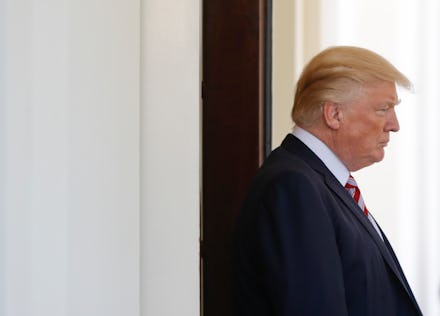Obstruction of Justice: Did Trump break the law by asking Comey to end investigation?

On Tuesday afternoon, the New York Times published a report claiming President Donald Trump tried to get former FBI Director James Comey to drop the investigation into Michael Flynn, Trump's former national security adviser. Comey kept track of his conversations with Trump in a series of memos, the Times reported. Coming less than six months into Trump's presidency, the report has sown chaos on Capitol Hill and raised the specter of impeachment from Democrats and even one Republican.
Criminal prosecution unlikely
It's important to note that, whether or not Trump actually attempted to strong-arm Comey into dropping the investigation, he probably won't be charged with a crime, because, as Helen Klein Murillo notes in the Lawfare blog, "1. The burden of proof makes proving obstruction in this context difficult, and 2. Discretion over criminal investigation and prosecution is committed to the Department of Justice, headed by Attorney General Jeff Sessions and Deputy Attorney General Rod Rosenstein, both of whom recommended Comey's dismissal."
But Trump could still be impeached for obstruction, even if he isn't found guilty of a crime. The question, then, is whether what Trump did constitutes obstruction and whether those with the power to punish him would do so.
To the first question: Obstruction is hard to prove. The Atlantic's Matt Ford spoke to several experts and the consensus was that Trump might have obstructed justice, but more information is needed.
John Barrett, who was as an associate counsel for the independent counsel's office during the Iran-Contra affair, told the Atlantic that the contents of Comey's memo warrant a criminal investigation. "Much will depend on how Comey, and any other witnesses, understood the statement as they heard it," Barrett told the Atlantic. "But this, as reported, is a piece of serious evidence of possible criminality. It is plainly a basis for criminal investigation and evaluation."
Why did Trump fire Comey?
The tricky part is that investigators would have to prove that Trump not only attempted to influence Comey, but also did so with "corrupt intent." Proving someone's intent is difficult, and Trump has already offered a legitimate reason (legally speaking, at least) for firing Comey: that his handling of the investigation into Hillary Clinton's private email server had sapped his credibility with the FBI and the public to the point that he was no longer able to lead the bureau effectively. If that's why Trump really fired Comey, it's not obstruction.
However, Trump hurt his own case in an interview with NBC's Lester Holt when he said, "When I decided to [fire Comey], I said to myself, 'You know, this Russia thing with Trump and Russia is a made-up story by the Democrats.'"
"If it emerges that he was trying to shut down the investigation to stop Flynn from implicating him in criminal conduct, that would be a different story," Bruce Green, a former federal prosecutor who worked as an associate counsel for the prosecutor's office in the Iran-Contra affair, told the Atlantic.
But all of this hinges on whether Republicans in Congress are willing to do anything about it. Impeachment doesn't require that a crime have been committed, but it does require a majority in the House and two-thirds of the Senate. And, so far, Republicans, who control both chambers, have been reluctant even to call for an investigation.